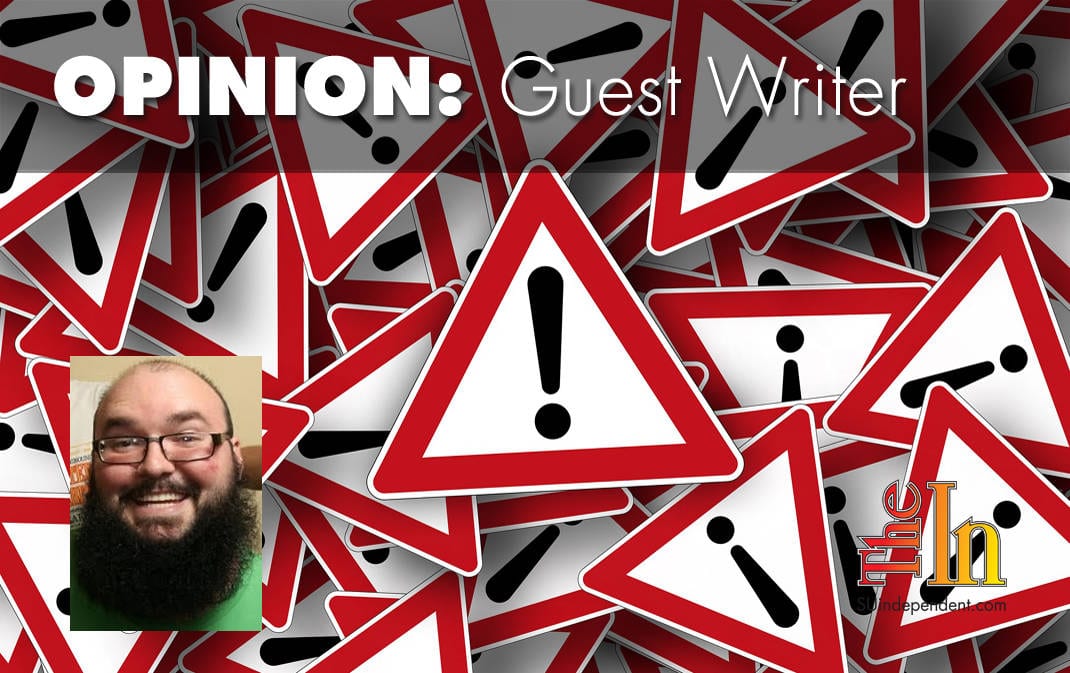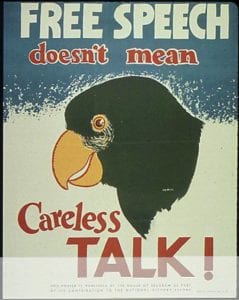 Recently, there’s been an uproar here in Las Vegas over a street sign put out by a downtown bar advertising a domestic beer special with a domestic violence joke lifted from a Bill Burr stand-up routine. The joke goes like this: “I like my beer like I like my violence: domestic.” Internet backlash was quick and strong, and regardless of the bar pulling the sign hours after it went up and suspending the bartender who posted it, the fight over the sign that is still continuing has been a surprising reversal of the regulation of language I was talking about in my last post.
Recently, there’s been an uproar here in Las Vegas over a street sign put out by a downtown bar advertising a domestic beer special with a domestic violence joke lifted from a Bill Burr stand-up routine. The joke goes like this: “I like my beer like I like my violence: domestic.” Internet backlash was quick and strong, and regardless of the bar pulling the sign hours after it went up and suspending the bartender who posted it, the fight over the sign that is still continuing has been a surprising reversal of the regulation of language I was talking about in my last post.
I was personally opposed to the sign. I thought it was tasteless and just brought up the sad fact that excessive drinking and domestic violence often go hand in hand. I also thought that after previous bad decisions, I had seen enough from the place to know that I wasn’t interested in going back at this point and said as much. As a consumer, I had decided I’d seen enough, but that was my personal decision. I saw a few other annoyed posts about it, but it wasn’t until going through the new reviews of the place that I realized how extreme the response was getting on both sides.
First off, the one-star reviews were roughly what you’d expect: a variety of people calling the sign deplorable, asking for the firing of the employee who made the sign, and telling about their friends or family who had experienced domestic violence. Then, there were two subsets of five-star reviews: the people saying the joke was in fact funny, and the people saying everyone who was offended by it were just weak and needed to toughen up. These posts went on for pages, the same points just reverberating in the cavern of Facebook’s review system. I’ve seen plenty of these arguments and just ignored them since I can usually understand some of the latter group’s mentality, but this time it just didn’t make sense for me. I can see how one person enforcing a language decision on others seems touchy because it’s absolutely subjective, but when it’s this sort of public and popular inverse, I don’t think that argument holds water any longer.

Ignoring the argument that the joke is funny (because humor is subjective and some people enjoy jokes making light of tragic situations), the idea that this sign should be displayed on a public sidewalk making a joke about any situation that caused 43 deaths in the past year seemed absurd. If the sign was a joke about school shootings or drunk driving accidents, it would be equally abhorrent: You just don’t sell beer in a way that makes light of disasters or the potentially mortal consequences of drinking. It’s an unbelievably poor choice of public face to put on your business, and it’s understandable that people wouldn’t want to be reminded of friends, family, and colleagues who’ve dealt with abuse via a domestic beer special. It’s not exactly yelling “fire” in a crowded theater in terms of restricted speech, but it’s still a pretty unfortunate public statement. That’s why I just can’t understand the portion of the response saying that this is people being too weak or coddled these days.
If you and I were talking and you made that same joke, I probably wouldn’t laugh. I’d probably tell you that my mother grew up in an abusive household and I don’t think that’s really prime material for goofs. I like to think most people would say, “I’m sorry, I guess that was out of line,” but it seems from this whole scuffle that a lot of people would rather respond with “Quit being such a wuss.” I know the internet makes it unusually easy for folks to be cruel, but insulting people for being sensitive to an issue that touches millions of people every year seems particularly heartless.
In my last post, I was talking about a problem with the enforcement of a subjective rule by the few over the many. That sort of misuse of power can be off-putting if it bumps up against you, because it’s just one person telling you what you can and can’t say, and it seems like a flippant choice. When the numbers are against you for what you’re saying — when the overwhelming sense from the court of public opinion is so decisively against what you’re standing up for — it might be time to ask yourself if you’re wrong. Most of the insults we tend to deliver come from our own insecurities, so when you call someone else weak for holding you responsible for the things you say, you might want to take a look in the mirror or maybe even try a stolen bit from a different comedian and get a certain different kind of sign all your own.



